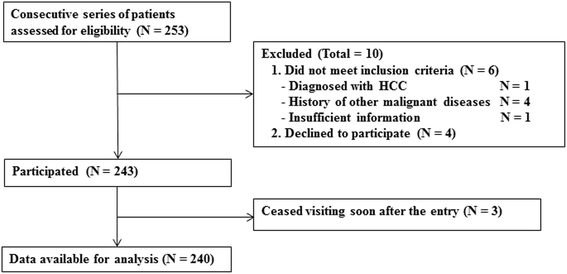Inhibition of emotional needs and emotional wellbeing predict disease progression of chronic hepatitis C patients: an 8-year prospective study
- PMID: 27478498
- PMCID: PMC4966853
- DOI: 10.1186/s13030-016-0075-3
Inhibition of emotional needs and emotional wellbeing predict disease progression of chronic hepatitis C patients: an 8-year prospective study
Abstract
Background: The role of psycosocial factors in the disease progression of chronic hepatitis C (CHC) patients remains unclear. The aim of the present study was to prospectively evaluate the prognostic value of behavioral patterns and the quality of life (QOL) of patients with CHC.
Methods: Two hundred and forty Japanese CHC patients (mean age 62.4 years) were assessed for behavioral patterns (Stress Inventory), QOL (Functional Assessment of Chronic Illness Therapy-Spiritual), and known prognostic factors at baseline then followed for a maximum of 8 years for disease progression, defined as either the first diagnosis of hepatocellular carcinoma (HCC) or hepatitis-related death.
Results: Forty-nine events occurred during the study period (46 newly diagnosed HCC cases, three hepatitis-related deaths). In a Cox proportional hazard model including known prognostic factors and treatment-related factors as time-dependent variables, behavioral patterns associated with inhibition of emotional needs (hazard ratio (HR): 1.35; 95 % confidence interval (CI): 1.02-1.77; p = 0.036) and QOL, representing emotional wellbeing (HR 0.60; 95 % CI 0.37-0.98; p = 0.041), were each associated with the risk of disease progression.
Conclusion: Psychosocial factors such as behavioral patterns relevant to the inhibition of emotional needs and emotional wellbeing independently affect the clinical course of patients with CHC.
Keywords: Chronic hepatitis; Emotion; Hepatocellular carcinoma; Prognosis; Psychosocial stress; Quality of life.
Similar articles
-
Higher risk of hepatocellular carcinoma in chronic hepatitis B vs chronic hepatitis C after achievement of virologic response.J Viral Hepat. 2017 Nov;24(11):990-997. doi: 10.1111/jvh.12723. Epub 2017 Jun 9. J Viral Hepat. 2017. PMID: 28499070
-
Long-term follow-up of patients with chronic hepatitis C treated with α-interferon and ribavirin antiviral therapy: clinical and fibrosis impact of treatment response.Eur J Gastroenterol Hepatol. 2017 Jul;29(7):792-799. doi: 10.1097/MEG.0000000000000886. Eur J Gastroenterol Hepatol. 2017. PMID: 28445251
-
Increased risk of hepatocellular carcinoma in chronic hepatitis C patients with new onset diabetes: a nation-wide cohort study.Aliment Pharmacol Ther. 2015 Oct;42(7):902-11. doi: 10.1111/apt.13341. Epub 2015 Jul 27. Aliment Pharmacol Ther. 2015. PMID: 26211742
-
Newly diagnosed hepatocellular carcinoma in patients with advanced hepatitis C treated with DAAs: A prospective population study.J Hepatol. 2018 Aug;69(2):345-352. doi: 10.1016/j.jhep.2018.03.009. Epub 2018 Mar 16. J Hepatol. 2018. PMID: 29551707
-
Psychosocial and Neurocognitive Factors Associated With Hepatitis C - Implications for Future Health and Wellbeing.Front Psychol. 2019 Jan 9;9:2666. doi: 10.3389/fpsyg.2018.02666. eCollection 2018. Front Psychol. 2019. PMID: 30687151 Free PMC article. Review.
References
-
- Hepatitis C Fact sheet. WHO media center. [WWW Document] URL http://www.who.int/hiv/topics/hepatitis/en/. Accessed 24 July 2016.
-
- Bruno S, Crosignani A, Maisonneuve P, Rossi S, Silini E, Mondelli MU. Hepatitis C virus genotype 1b as a major risk factor associated with hepatocellular carcinoma in patients with cirrhosis: a seventeen-year prospective cohort study. Hepatology. 2007;46:1350–1356. doi: 10.1002/hep.21826. - DOI - PubMed
LinkOut - more resources
Full Text Sources
Other Literature Sources


